The Interreg North-Sea project Shared Mobility for All, Europe’s community for accessible shared mobility, met in Amsterdam last month to set the course for piloting inclusive shared transport solutions in European cities and regions. The 3-day meeting brought the SMALL partnership together with mobility providers, academics and end users’ representatives to determine European best practice for launching shared mobility options comfortable for all users.
22 May - Kickstarting the meeting with the second SMALL roundtable event
The 3-day marathon kicked off with the second edition of the SMALL Roundtable. This is a yearly event where we bring together stakeholders from the shared mobility field together to discuss the challenges that our pilots are experiencing. Why organize a roundtable you say? Co-creation is one of the foundations of the SMALL project. Our pilots are actively organizing engagement moments with their end-users and stakeholders regarding their activities. However, co-creation can also be done on a more meta-level. This is where the SMALL roundtable events come into the picture. Through this format, we aim to provide support to the SMALL pilot cities in their process of setting up an inclusive shared mobility pilot.
Last year, we organised the first edition in Brussels where we focused on ‘How people with reduced mobility can become a main driver of shared mobility’. This resulted in the launch of our first SMALL Insights paper in September 2023.
For the second edition, we welcomed our participants in Amsterdam to discuss the challenges and considerations that need to be taken into account when rolling inclusive shared mobility pilots. Our discussions covered a range of topics, from organisational, infrastructure, and regulatory aspects to business, financial, and operational considerations. Finally, the roundtable concluded with one of the guiding questions of our project: how do we keep people with reduced mobility top of mind when setting up our pilots, and in the aftermath of the project?
Get a glimpse of our roundtable session
As organisers, we were aware of the luxury position that we were in to have this much knowledge and expertise in one room, so we had to make sure to use the right methodologies to guide the conversation in the SMALL direction.
1. Pilot pitch
To make sure that every participant was on the same page, we started the event with pilot pitches, making use of posters. With the help of posters, our pilot partners explained the core of their activities through their impact statements that they had formulated in the weeks before this event. This way our external participants could understand the purpose and the activities of our project.
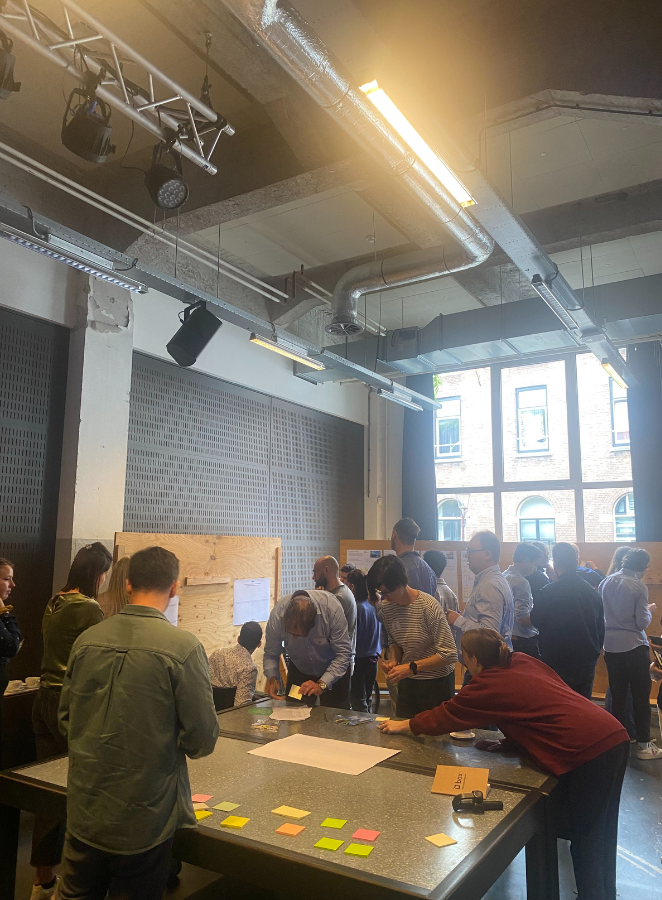
2. Post-it brainstorm on “things to consider when setting up your inclusive shared mobility pilot”
We started the discussion from the city perspective by highlighting the organisational challenges and opportunities when setting up pilots. We asked every participant to answer sub-questions regarding collaborations, regulations, and decision-making processes. After filling in their input on post-its, we held a plenary discussion going over the different topics. This session showed us where the priorities lie with the cities. It was clear that everyone saw the potential of pilot sites, when using them to gather data and refine services before broader implementation.
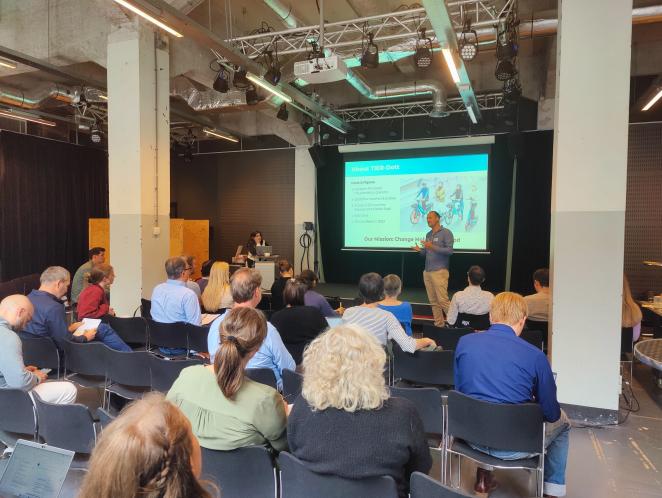
3. Presentations from Dott-Tier and Voi
In the following session, we switched to the operator's perspective. How much does an inclusive shared mobility pilot cost for an operator? What are the extra costs of purchasing and operating adapted vehicles? And what do they need from us as a partnership and from cities to make people with reduced mobility more top of mind in their services?
Sebastian Schlebuch from Dott-Tier presented the business perspective, while Nicolas Belloni from Voi clarified the designers’ perspective. Did you know that both providers are already experimenting with the feasibility of various measures targeted at specific groups, such as e-bikes with child seats?However, Shared Mobility for ALL is currently not possible. Operators are working on increasing the total addressable market, but to make sustainable investments to make their services more accessible for more groups, they need to become more profitable on the current users they have.
After their presentations, we held another plenary discussion where needs were exchanged from both the operators as the cities’ side. Once more, the discussions proved that there is a need for, and a willingness to explore, public-private partnerships and subsidies to support inclusive mobility solutions.
4. Customer journey
In the last session of the day, we decided to go back to the main purpose of our event: the end-users. The first two sessions showed us that it’s very easy to lose sight of the needs of the end-users when making decisions or creating solutions.
This is why we wanted to end the day by putting the people back on the top of the agenda. All of our pilots are clustered in three topic groups: digital solutions, multimodality, and volunteering schemes.
For each topic, we had created overarching customer journeys based on the pilot level customer journeys designed by our pilot site teams in the weeks before the event which highlighted the main challenges experienced by end-users.
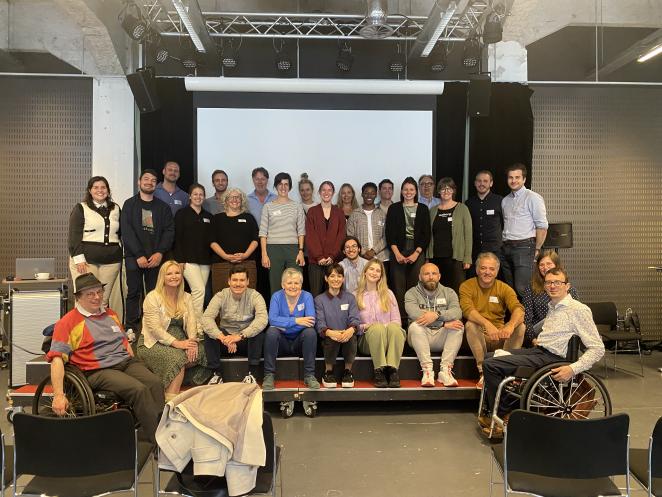
The aim was to overcome each challenge in each phase in collaboration with input from the external participants. This session showed that when you put the end-user in the centre of your activities, constructive collaboration starts forming. This collaboration can tackle first-last mile challenges by offering integrated solutions and clear guidance, leading to seamless and accessible user journeys at every stage.
At the end of the day, we took note of everything that was said and were ready to start our partner meeting in Amsterdam. The next step of the roundtable is to summarize everything in the second edition of the SMALL Insights Paper that will be launched in Autumn 2024. Stay tuned!
Thanks to our participants who dedicated an entire day to co-creating better solutions for accessible piloting and shared their knowledge with our SMALL consortium.
23-24 May: SMALL 3rd partner meeting
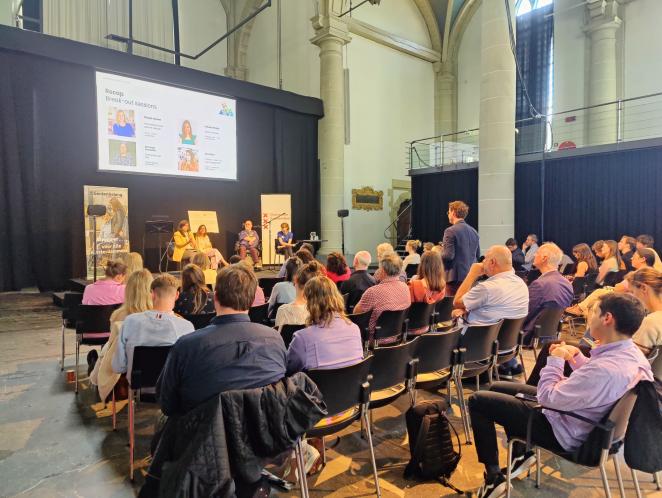
Day 1
It has now become a tradition: a poster session to begin our partner meeting. 11 pilots to hear news from, 8 mins for each and a bike klaxon to smooth each transition. This time, we celebrated some on-the-ground launches of pilots in France and discussed some barriers and challenges other partners are experiencing. Look out for more insights to come on our pilots in our upcoming blogs.
We continued our day with a co-creation boardgame, specially made for the occasion, which we hope to release by the end of the project. During the last 6 months, all our partners organised co-creation events with their end-users; this board game was the perfect format to bring all this knowledge together and learn from each other.
Finally, we finished the day with the Amsterdam for All event, a program that aims at improving the accessibility of Amsterdam. The event turned out to be an inspiring afternoon, during which various projects were presented and was a great way to meet locals working on different accessibility projects (e.g. broken elevators, wayfinding for wheelchair users). Our Lead Partner Mpact, represented by Esen Köse, also had the opportunity to present our project, both on stage and during a workshop about co-creation and impact statements.
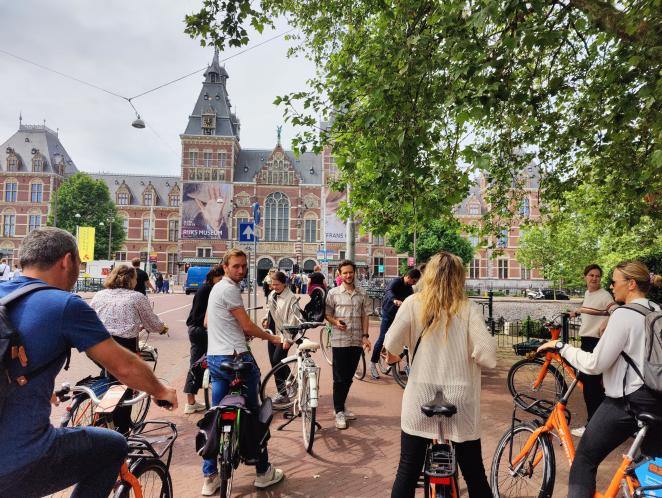
Day 2
The energy and enthusiasm were still high for the second day of the partner meeting and third day together.
We began day 2 by focusing on performance metrics for our pilots. As our pilots are making progress, it is now time to ensure we come up with robust methodologies to analyse the impact of our mobility solutions. We need to define metrics, leading and lagging KPIs...
It is not easy for everyone to grasp, but fortunately for us, our researcher Maite Dewinter from University of Ghent knew how to teach us while keeping us entertained. We played bingo to learn from each other’s metric’s ideas and we had a dynamic fishbowl conversation to support each other's with our methodologies.
After that, we took a city tour in Amsterdam to experience the cycling experience while using sharing mobility. We discovered different areas of the city and their cycling history, while comparing our experience to our most recent trip to Copenhagen. Which city is the friendliest to cyclists? All SMALL partners still can’t agree on it.
Following our cycling tour, and with energy levels slowly going down, we decided to end the day with two lighter activities. We played an accessibility boardgame developed by TUM Munich to put ourselves in the shoes of various people with reduced mobility. “I am stuck” was the main sentence we heard, meaning the boardgame did its jobs: highlighting how the current built environment and mobility system prevent many people from moving in the city.
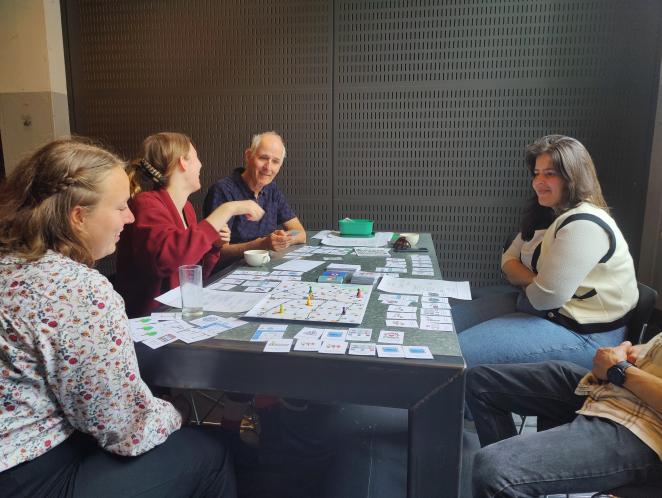
Finally, we finished our meeting with a conversation about universality and a suggestion from Sami Angsthelm to move away from personas to mobility needs. Using personas, such as children and families, has been great to identify ourselves with people and their needs; however, it makes the development of our solutions focus solely on one’s needs while our solutions need to be as accessible to as many people as possible. We now instead must focus on all mobility needs and try to ensure our solutions cater to as many as possible.
This final conversation was a positive critical outlook on our project to finish our partner meeting, ensuring we all collectively learn and steer it in the most impactful direction.
From here, SMALL partners will work further on getting their pilot sites started and measuring the impact of their activities with the support of our knowledge partners.
Follow our updates on LinkedIn or get access to our online forum as we share more learnings and insights from the SMALL Roundtable and partner meeting.
